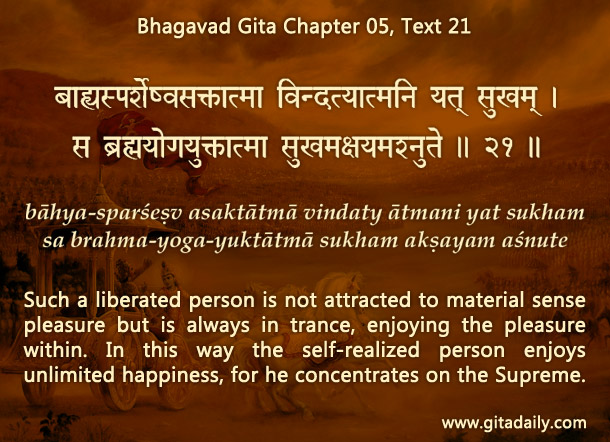When our endeavors don’t lead to success, how can we cultivate gratitude? By contemplating what really matters for us.
Aiding such contemplation, Gita wisdom offers a holistic vision of our place and purpose in the world, wherein we function simultaneously at two levels: external and internal.
External function: The Bhagavad-gita (03.20) exhorts us all to help in loka-sangraha, maintaining the world’s orderliness by doing our expected duty within it. We strive to use our God-given ability for improving our and others’ circumstances, thereby helping to make the world a better place. With this vision, our driving purpose expands: we work not to gain personal possession or reputation, but to make a social contribution and help in social transformation. When we thus work for something bigger than ourselves, our work gives us deep fulfillment.
Internal function: Further broadening our vision of our purpose, Gita wisdom reveals that we are eternally parts of the biggest, best reality: the omni-benevolent divinity, Krishna (15.07). When we work in a mood of service to him (18.47), we become instruments of his wisdom and compassion for making tangible changes in the world (11.33). But even if no such outer changes manifest, our very service and the underlying service attitude make us more attracted and attached to Krishna. Because he is the reservoir of all happiness, that divine connection enriches us with inner satisfaction (05.21).
When we appreciate that transforming our consciousness matters far more for us than transforming our circumstances, we can feel grateful for every opportunity to do activities that can transform our consciousness, even if those activities don’t transform our circumstances.
One-sentence summary:
When we are successful, we can improve our circumstances; even if we are not successful, if we just remain purposeful, we can still improve our consciousness — focus on being purposeful, not successful.
Think it over:
- How does Gita wisdom expand our driving purpose?
- How can we find fulfillment in the absence of success?
- When does our gratitude become independent of external success?
***
05.21: Such a liberated person is not attracted to material sense pleasure but is always in trance, enjoying the pleasure within. In this way the self-realized person enjoys unlimited happiness, for he concentrates on the Supreme.
To know more about this verse, please click on the image


Harekrishna Prabhuji beautifully presented and is surely a canon of full of inspiration to ‘ do whatever but for the pleasure of The Lord and for upliftment of general ignorant masses’…
Wonderful article… Definitely going to impact many including an insignificant servant like me…. Thanks a lot Prabhu… Harekrishna
Thanks for your comment; happy to be of service.